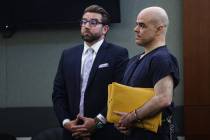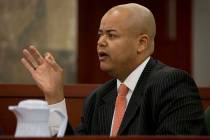State Supreme Court to hear ACORN case
A criminal case that tarnished the reputation of the former community organizing group ACORN will be reviewed by the state's high court, which will consider whether the law used to prosecute defendants breaches free speech protections.
Lawyers from the high-powered firm Jones Vargas argue the state law that makes it illegal "for a person to provide compensation for registering voters that is based upon the total number of voters a person registers" is vague and violates the First Amendment.
But prosecutors say that the state has a "compelling interest in protecting the integrity of the voter registration process" and that compensation programs have led to voter fraud in the past.
The Supreme Court is expected to set a date soon for oral arguments when justices will grill attorneys on hundreds of pages of court documents and then determine whether to let the law stand or tear it down.
The appeal in the ACORN case comes from defendant Amy Busefink, who in November 2010 struck a deal and pleaded no contest to two misdemeanor counts of conspiracy. She was sentenced to a year of probation, ordered to pay a $4,000 fine and perform 100 hours of community service.
As part of the deal with prosecutors, she was allowed to challenge the law.
State prosecutors said ACORN, the Association of Community Organizations for Reform Now, and Busefink authorized a Las Vegas field operative to run an illegal voter-registration program during the 2008 election cycle that paid cash to encourage canvassers to sign up voters.
About $65 in bonuses was paid out.
Busefink's lead appeal lawyer, Bradley Schrager, argued Nevada Revised Statute 293.805 violates the First Amendment because U.S. courts have long considered voter registration efforts as political speech.
The state has argued compensation programs have led to or encouraged voter fraud, Schrager said, but there are other state laws that make illegal the falsifying of voter registration applications.
Schrager contends NRS 293.805 undermines groups such as ACORN by limiting the effectiveness of paid canvassers: Paying a canvasser a set salary will not lead to a large number of applications, but offering compensation for the number of applications gathered motivates workers.
The state attorney general's office disagreed. Prosecutors Robert Wieland and Jared Frost argued that "nothing in NRS 293.805 prohibits vote(r) registration organizations like ACORN from conducting paid voter-registration drives, paying canvassers on an hourly basis, or awarding bonuses based on factors other than the number of persons registered."
The law imposes a minimal burden on political speech by limiting the illegality only to compensation for the specific number of voters registered, prosecutors argued. The state has a vested interest in preventing a program that encourages voter fraud, prosecutors said.
The law dates to 1993, when accusations of election fraud erupted after complaints about deputy field registrars falsifying voter party affiliations to collect a $2 bonus for each returned Democratic application, court records show.
The ACORN case was the first time the law was used to prosecute anyone.
Schrager also argued that the term "register" in NRS 293.805 is vague because under Nevada law "only the registrar of voters, designated field registrars, and -- arguably -- the voter himself or herself may 'register' a voter."
The ACORN canvassers were only handing out applications to register voters, Schrager said.
The state replied the term "register" is common parlance, so much so, that during testimony in the case, ACORN canvassers referred to what they were doing as registering voters and not distributing applications.
But, Schrager argued, the state recognized the confusion the term "registering" created and during the 2009 legislative session proposed to amend the law. The amendment would have changed the wording of the law from prohibiting "compensation for registering voters" to prohibiting compensation for "completed applications to register to vote."
"The proposed legislation did not pass, but its terms reveal concern that the current statute does not properly describe the conduct it seeks to prohibit," Schrager said.
Originally, authorities said ACORN also had an illegal quota policy that forced workers to register a certain number of people per shift or face termination. But prosecutors during the appeal argued it is not a crime to have a quota that sets performance criteria.
Schrager said the switch in the interpretation of the law by prosecutors points to its vagueness. "If this is not evidence of an impermissibly vague statute .... then such (evidence) does not exist."
In August, a defunct ACORN was fined a maximum $5,000 fine after it pleaded guilty four months earlier to one count of felony compensation for registration of voters.
The state probably will never see the money. When the national organization closed its doors in April 2010, the group had assets totaling less than $4,000 and "liabilities of more than $4 million," according to court records.
The field operative who created and ran the incentive program, Christopher Edwards, is serving three years of probation after pleading guilty to two misdemeanors.
Busefink, who oversaw Edwards, is a longtime employee of Project Vote, a national grass-roots organization that registers voters and worked with ACORN in 2008.
ACORN officials maintained that Edwards was ordered not to run the incentive program.
The program, called Blackjack or 21-Plus, rewarded workers with $5 extra per shift if they brought in 21 or more completed voter registration cards.
An investigation of the compensation scheme was launched after several false registrations were turned in to the county registrar of voters. In one case, registration forms contained names from the Dallas Cowboys football team, but those fraudulent forms were shown not to have come from ACORN workers, defense attorneys said.
Prosecutors never charged anyone with turning in a fraudulent form.
The 40-year-old group, which once counted President Barack Obama among its ranks in Chicago, came under fire in recent years for its voter registration tactics.
Conservatives condemned it as a pro-Democratic group engaging in partisan activities, which violated the tax-exempt status of some of its affiliates.
Congress effectively killed off the group when it slashed the organization's federal funding after a hidden-camera sting by conservative operatives showing ACORN workers giving advice on illegal activities.

















